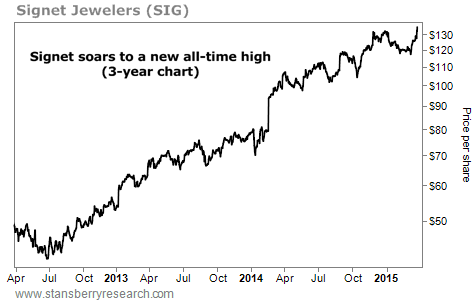| Home | About Us | Resources | Archive | Free Reports | Market Window |
The Hard-Earned Truth About Recreational Real EstateBy
Friday, March 27, 2015
A group of us were having lunch on my recent ski trip to the French Alps.
One of the guys leaned across the table and showed me some photos on his iPhone.
The images showed a stunning piece of property. A gorgeous chalet set amongst the trees and snow of a mountain resort in western Canada. A very seductive piece of real estate.
I commented that he and his wife must rattle around in there like peas in a pod given how big the property was.
"Yep, we do, now that the kids have grown and are off doing their own thing."
"Expensive to run?" I queried.
"Very" came back the reply, instantly. "In fact I could take two months holiday each year in some of the best resorts in the world with the cash that I pay just to manage this place."
"Do you have any plans for the property? I asked.
"Absolutely. We're trying to sell the place... It's been on the market for nearly a year. No serious buyers yet."
I hear this story repeated constantly from friends and acquaintances all over the world.
They fell in love with a piece of "recreational real estate."
The family doesn't really use it much these days. The kids have flown the nest and have their own agendas.
Maintenance and management costs are very high. This isn't a simple lock-up-and-leave apartment.
Worst of all, the property cannot produce a decent reliable rental income stream.
And this all comes just as retirement is hitting home and that regular paycheck is fading.
I know other owners of recreational-type real estate in France, Italy, Spain, Croatia, New Zealand, Australia, even Canada and the U.S. who are trapped with their properties.
Yet, in major cities in these countries, real estate markets are often doing well. Prices have recovered. But more importantly, there is liquidity. By that I mean deals are getting done.
That is not the case in those wonderful beach, river, mountain, and lakeside locations.
In my opinion, recreational real estate is often not an investment at all. It is an expensive consumption item.
We all have the potential to get seduced by that wonderful country cottage, the beach house, the chalet in the mountains. I have almost succumbed to this temptation a number of times myself.
I remember sitting in the enormous garden of a friend's house in the south of France one sunny summer afternoon a few years ago, drinking rosé and thinking, "I could make this work." I even got in touch with a few agents... But fortunately, I came to my senses.
The trouble is that rationality tends to fly out the window when we look at these beautiful examples of the builder's art. There is no doubt that you and the family may love to spend a couple of weeks, or even a month a year there, if you're lucky.
But think about some of the realities...
Owning a recreational home somewhere narrows your options. Perhaps you might want to go to other places, experience other countries, locations, activities. Owning that cottage by the lake means that you may not get to enjoy other experiences so much, if at all.
And what about management of the cottage, chalet, or house when you are not there? Or when you do go there? I know people who spend the first week of their holiday doing maintenance chores and fixing broken gear at their holiday home. If that is what cranks your crank, then fine. But most of us view our holiday time a bit differently.
And who is going to manage the property for the many months that you are not there? To check that pipes have not broken and that the windows and roof are not leaking. And to ensure the place doesn't become overrun with insects, mice, cockroaches... It happens, I assure you.
And then there is the cost of that management service. Employing a professional management company can be expensive. You can pay anywhere from 10% to 40% of your rental income to your management and listing agency.
My email inbox is loaded with files of wonderful, seductive, gorgeous recreational real estate sent by agents from all over the place.
I do find myself having a browse and getting a sense of how markets are behaving. But I do not get tempted these days.
I have enough expensive vices in life as it is. Being a boat owner is one of them!
But don't get me wrong, I don't believe you shouldn't indulge your real estate fantasies. But recognize them for what they are. Just that – a wonderful fantasy to be enjoyed and paid for.
Worst of all, I've seen so many friends and acquaintances put their hard-earned money into holiday real estate without even owning proper investment real estate!
It's madness!
To my younger readers, the ones in their 30s who may now have a little cash in the bank, please ignore recreational real estate. Forget about it.
In my opinion, it only makes sense if you already have a property or two under your belt, like a home and an investment property.
I am a big believer in owning real estate for long-term capital preservation, growth, and income.
A small property or two in your investment portfolio can provide a big boost to your income stream later in life.
If you are looking at real estate, make sure it's at least a solid investment property.
And by that, I mean a nice one- or two-bedroom apartment. It should be in a location where people wear suits and ties to work. Somewhere you and a better half would be happy to live yourselves.
That's exactly how I've built my investment property portfolio. My properties all have one to three bedrooms. They're located in areas favored by professionals and are therefore rarely vacant. They are in major global cities with solid property rights and transparent legal systems. And they require minimal maintenance.
By the time you're in your late 50s, the mortgage will be paid off and you will likely be sitting on good capital gains. On top of that, you'll have an asset that's spinning off free cash flow month after month.
I can't tell you how many folks in my generation wish they had a couple of those kinds of assets right now...
Good investing,
Peter Churchouse
Further Reading:
Steve recently shared why he still thinks it's a good time to buy U.S. real estate. "Mortgage rates are once again near all-time lows," he writes. "And we are still just getting out from under the worst housing bust in generations. This is when you want to buy." Get the full story here.
Steve also thinks U.S. stocks have plenty of upside from here. "We can't know the future," he writes. "But from what I see, stocks still have plenty of room to head higher." Find out why right here.
Market NotesCHEAP RESOURCES ARE BOOSTING THIS STOCK Today's chart looks at the soaring stock price of the world's largest specialty jeweler.
Earlier this week, we explained how retail stocks are benefitting from low oil prices. Because oil's byproduct, gasoline, is a large expense for families, falling oil prices are giving the uptrend in "spending stocks" a boost. One great example is Signet Jewelers (SIG)...
Signet Jewelers is the world's largest specialty jeweler. Operating mainly in the U.S., U.K., and Ireland, it owns popular jewelry retailers Zales, Jared, and Kay Jewelers. Since jewelry is an "I want this" – rather than an "I need this" – purchase, the jewelry industry rises and falls with consumers' propensity to spend money.
As you can see below, folks are spending. Shares are up 170% over the past three years. And just yesterday, the company announced a 30% rise in profits last quarter. Shares hit a new all-time high on the news. Since precious metals are one of the largest expenses for jewelry companies, low precious-metals prices are providing an even bigger boost to this trend. As long as oil and precious-metals prices remain low, the world's largest specialty retailer should benefit.
 |
Recent Articles
|



